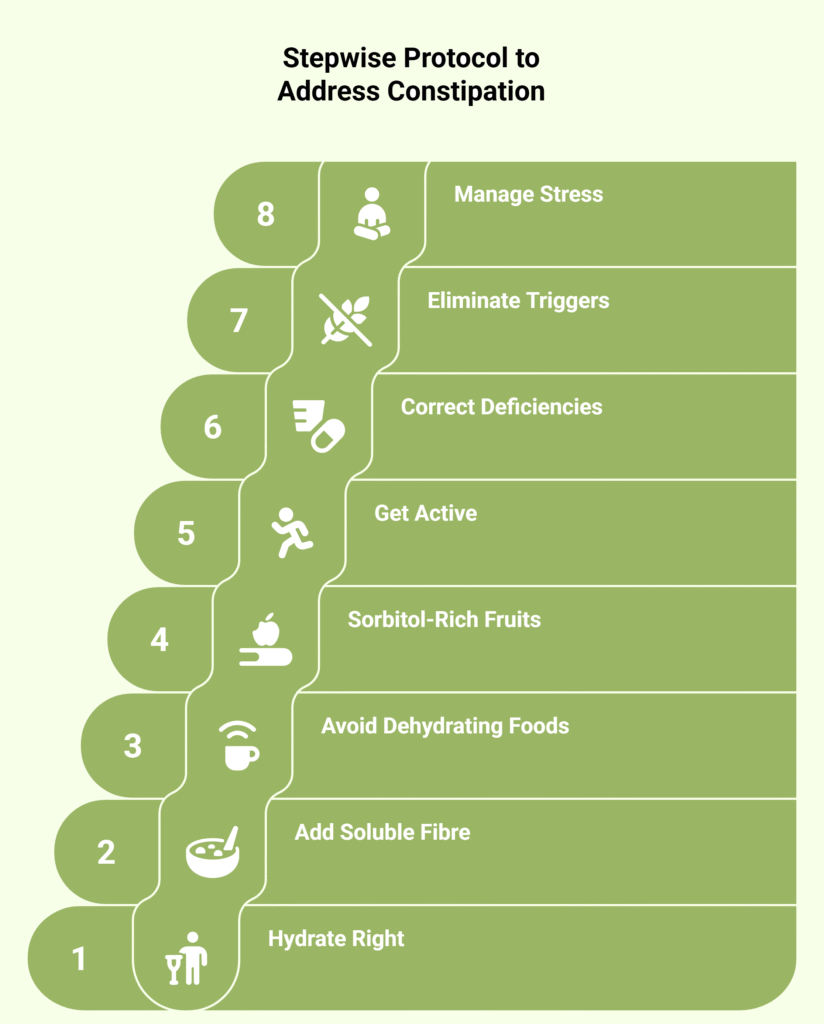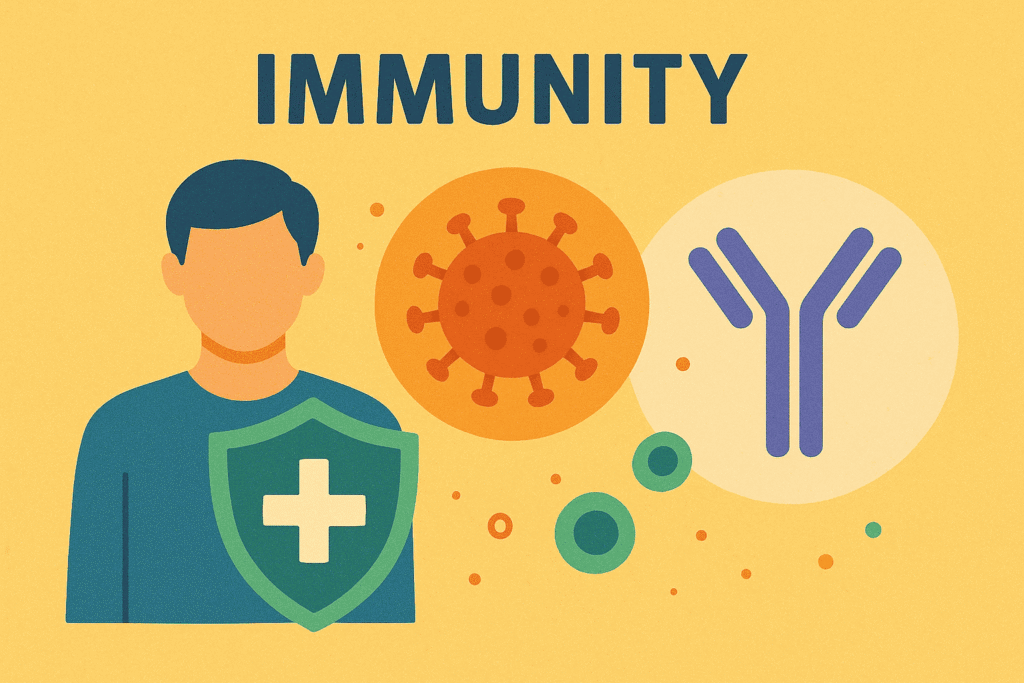Constipation: Why Water and Fibre Alone Don’t Solve the Problem

Most of us have experienced that stuffy, bloated, and suffocating feeling of constipation at some point. It’s frustrating, uncomfortable, and often makes you irritable. As per Western Constipation is when you poop every alternate day but I say it should be a daily affair.
For many people, the usual advice—“drink more water and add fibre”—just doesn’t work. Even with 2–3 litres of water, vegetables, isabgol, or fibre supplements, constipation persists. Over time, many end up relying on laxatives like Cremaffin, Duphalac, or Softovac just to feel “complete.”
But here’s the truth: Constipation isn’t always about fibre and hydration. Two key players often overlooked are your Liver and Gut Health. When these aren’t working optimally, bowel movements slow down, toxins build up, and what seems like a simple issue can turn into bigger health concerns.
How Constipation Can Aggravate Health Conditions
Chronic constipation is more than an inconvenience, it can worsen or trigger several conditions:
Estrogen Dominance (Endometriosis, Fibroids, PCOS): Poor elimination prevents excess hormones from being cleared.
Hypothyroidism: Already slows gut motility, making constipation worse.
Irritable Bowel Syndrome (IBS) & Inflammatory Bowel Disease (IBD): Constipation adds to bloating, cramping, and pain.
Cardiovascular & Neurological Health: Straining raises blood pressure and increases risk of heart and stroke events.
Weakened Immunity: A sluggish gut raises toxin load and hampers immune response.
Fissures & Hemorrhoids: Hard stools cause painful tears and bleeding.
Natural Remedies for Constipation: A Step-by-Step Guide

If constipation is a frequent problem, here’s a chronological protocol you can try at home that is usually effective. Start simple—if Step 1 doesn’t help, add Step 2, and so on.
Step 1: Hydrate the Right Way
Aim for at least 2 litres of fluids daily.
Ensure 40–50% of your intake comes from infused or functional drinks like chaas, lemon water, spice drinks, matcha, or coconut water.
These provide electrolytes for better cellular hydration.
Step 2: Add Soluble Fibre (Beyond Just Vegetables)
If veggies don’t solve the issue, focus on soluble fibre:
Cluster beans, chia seeds, guava, fenugreek, apples, oats.
These soften stools and improve gut motility.
Step 3: Avoid Dehydrating Foods
Reduce intake of foods that dry out or slow the gut:
Khakra, kurmura, chips, biscuits, and aerated cold drinks.
Step 4: Sorbitol-Rich Fruits
Include fruits naturally high in sorbitol (a natural laxative):
Pears, apples, prunes, peaches.
These draw water into the intestines and ease elimination.
For the Dried Prunes simply soak them in water and then include.
Step 5: Get Active
Walk 6,000+ steps per day.
Focus on core activation through yoga, stretches, or light workouts.
Step 6: Correct Nutrient Deficiencies
Constipation often links to low levels of:
B-complex vitamins (nervous system & motility).
Vitamin C (softens stools).
Magnesium (relaxes the muscles and nervous system)
Step 7: Eliminate Food Triggers
Some foods trigger inflammation and worsen constipation. Try reducing:
Dairy, wheat, and certain nuts esp pistachios and peanuts.
Step 8: Manage Stress
Stress directly slows digestion and impacts the gut-brain axis.
Practices like breathwork, meditation, journaling, or yoga help restore balance.
For more details, check my blog on Stress Management and Gut Health.
When to Seek Professional Help
These steps usually solve constipation if it’s due to temporary imbalance. But if the problem persists despite lifestyle changes, it may signal a deeper gut issue—like SIBO, sluggish liver, or microbiome imbalance—that requires professional intervention.
Client Case Study: 18-Month Fissure Healed in 3 Weeks
One of my clients suffered from fissures for over 18 months. Despite medications, she had constant pain when eliminating. By addressing her hydration, soluble fibre intake, nutrient deficiencies, and food triggers in the right sequence, she saw dramatic improvement—and her fissure healed—in just 3 weeks.
This shows that with the right root-cause approach, even chronic constipation and its complications can be reversed naturally.
Frequently Asked Questions (FAQ) on Constipation
Which Indian foods are best for constipation relief?
Some of the best Indian foods for constipation are: papaya, guava, soaked raisins, figs, prunes, cluster beans (gavar), fenugreek (methi) seeds, chia seeds.
Is banana good for constipation?
It depends on the ripeness of the banana. Ripe bananas (yellow with brown spots) contain soluble fibre and can ease constipation. Raw or unripe bananas may worsen it. But you definitely have to have a holistic approach rather than relying on couple of food ingredients to do the magic.
Can constipation be a sign of liver or thyroid problems?
Yes. Hypothyroidism slows gut movement, while a sluggish liver reduces bile flow. Both can worsen constipation.
When should I see a doctor for constipation?
If constipation lasts for more than 3 weeks, is accompanied by severe pain, blood in stool, unexplained weight loss, or fissures, consult a healthcare professional immediately.
 Key Takeaway
Key Takeaway
Constipation is not just a digestive issue, it affects your hormones, liver, immunity, heart, and overall health. Instead of relying solely on laxatives, take a holistic approach with hydration, fibre, movement, stress management, and nutrient correction.


Naina Singhania
Registered Dietitian | Functional Nutritionist |
Diabetes Reversal Expert | Gut and Hormone Health Management
About Naina: Naina is a Registered Dietitian of India practicing since 2013. She works in the field of Weight Management, Diabetes Reversals and Women’s Health (PCOS, Infertility). She lives in Mumbai and caters to clients worldwide. Her approach is a combination of Ayurvedic Analysis along with scientific base in Functional Nutrition allows her to get into the root cause of the problem and provide customised solutions to her clients.





